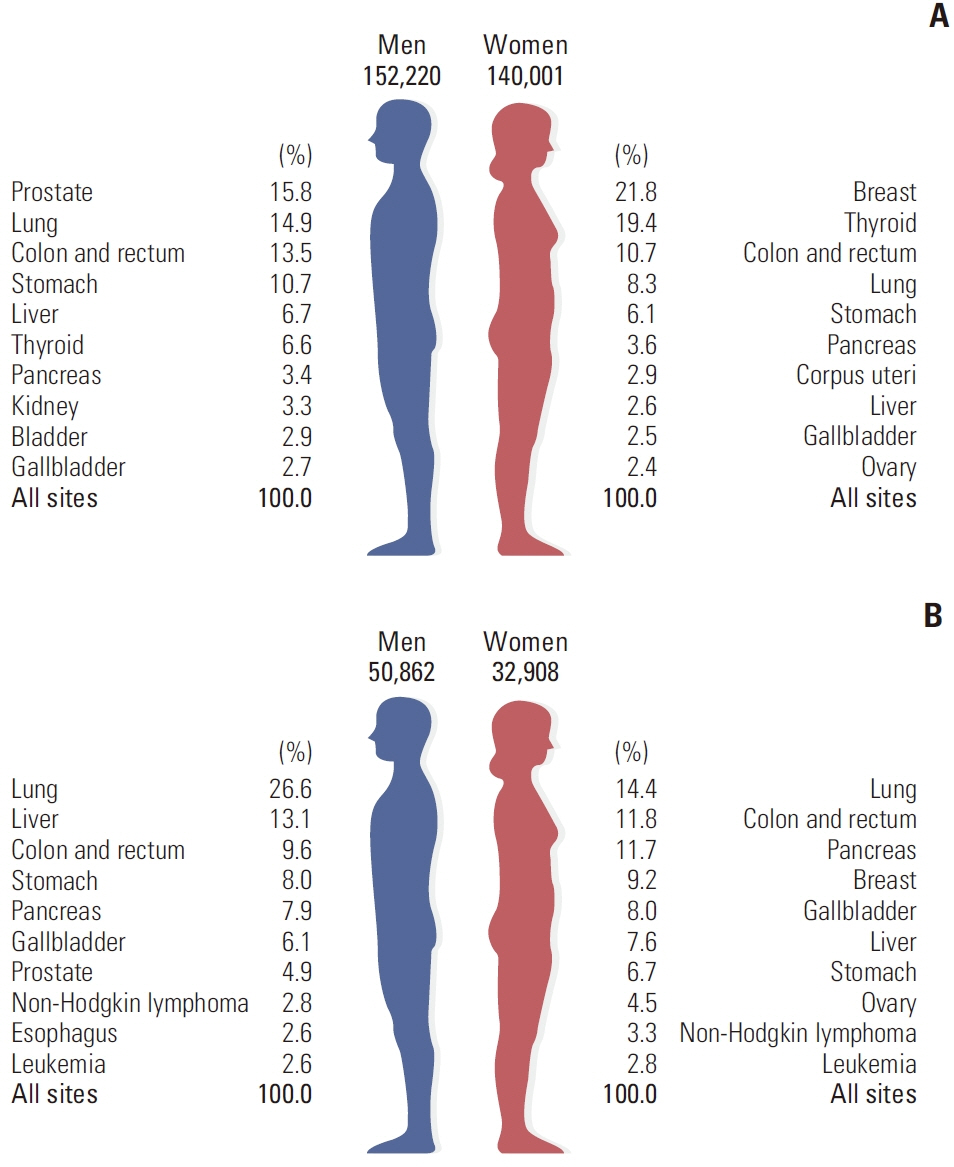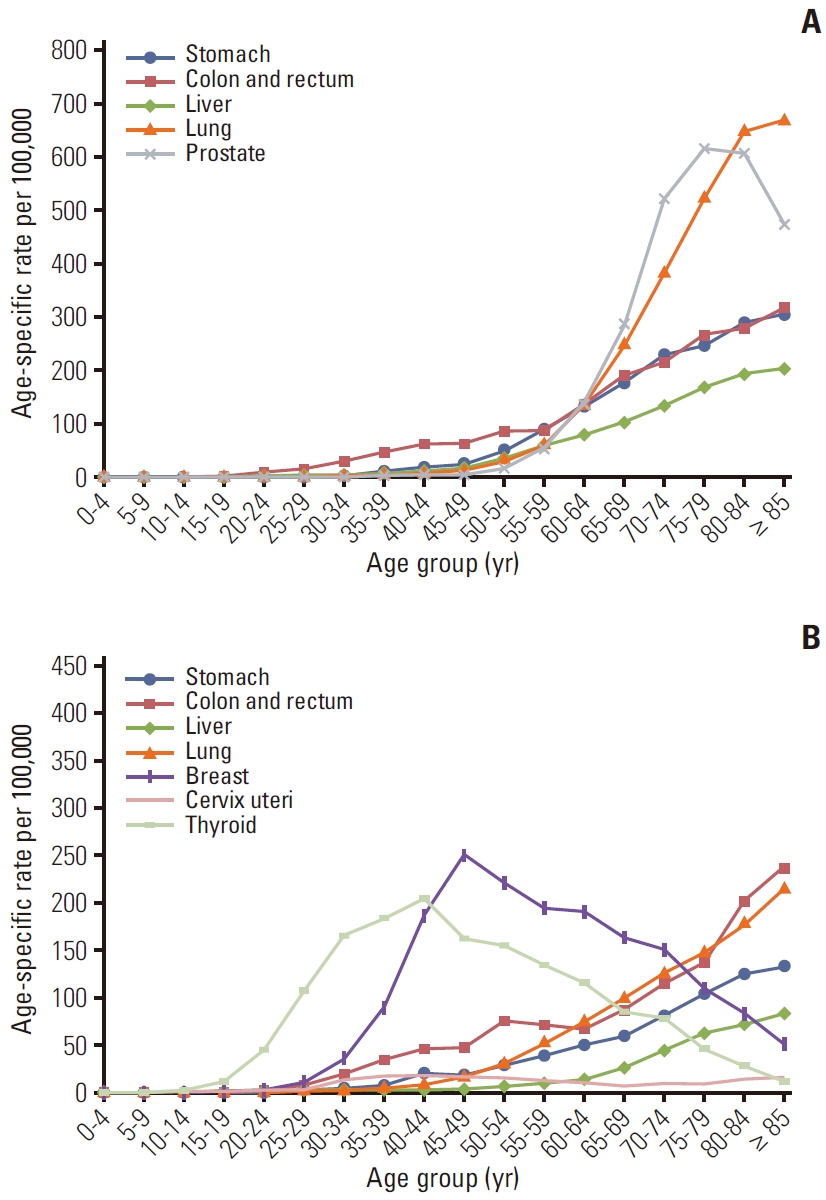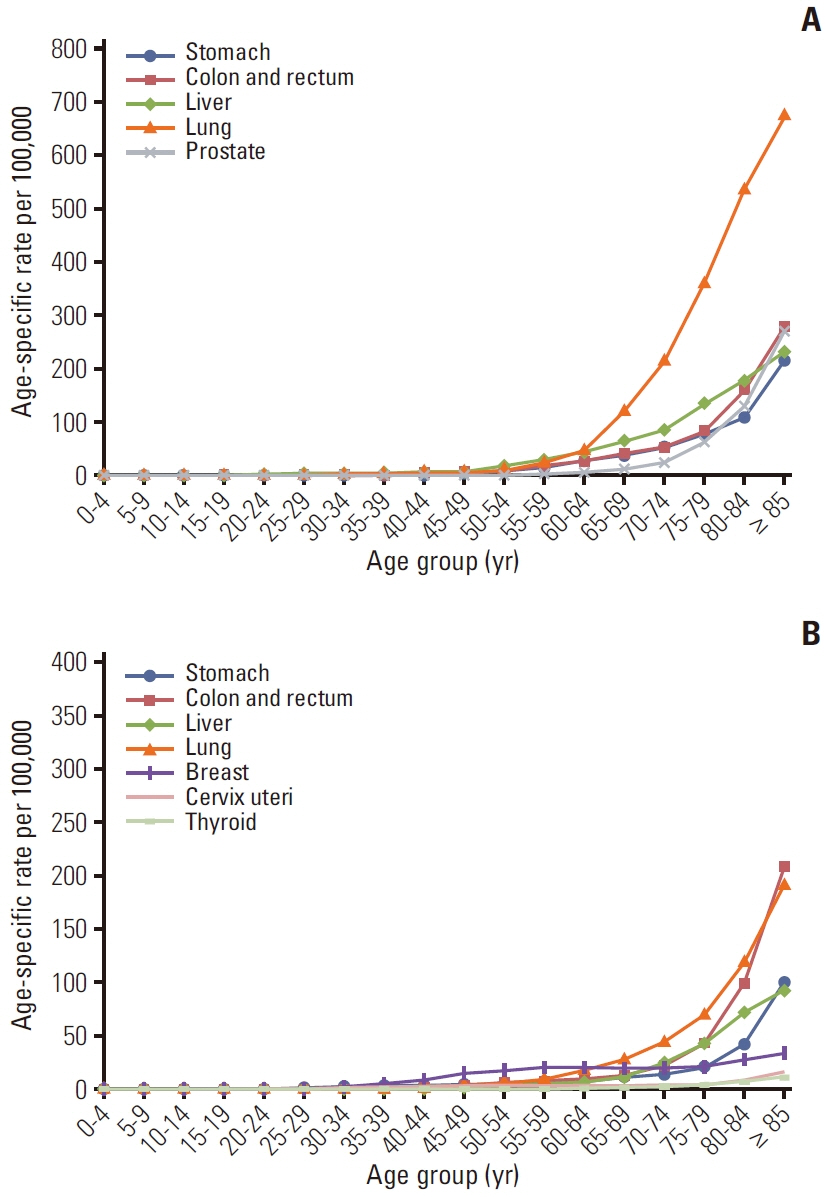Cancer Res Treat.
2024 Apr;56(2):372-379. 10.4143/crt.2024.252.
Prediction of Cancer Incidence and Mortality in Korea, 2024
- Affiliations
-
- 1Korea Central Cancer Registry, National Cancer Center, Goyang, Korea
- 2Division of Cancer Registration and Surveillance, National Cancer Control Institute, National Cancer Center, Goyang, Korea
- 3National Cancer Center Graduate School of Cancer Science and Policy, National Cancer Center, Goyang, Korea
- 4National Cancer Control Institute, National Cancer Center, Goyang, Korea
- KMID: 2554329
- DOI: http://doi.org/10.4143/crt.2024.252
Abstract
- Purpose
This study aimed to report the projected cancer incidence and mortality for the year 2024 to estimate Korea’s current cancer burden.
Materials and Methods
Cancer incidence data from 1999 to 2021 were obtained from the Korea National Cancer Incidence Database, and cancer mortality data from 1993 to 2022 were acquired from Statistics Korea. Cancer incidence and mortality were projected by fitting a linear regression model to observed age-specific cancer rates against their respective years and multiplying the projected age-specific rates by the anticipated age-specific population for 2024. A joinpoint regression model was used to determine the year in which the linear trend changed significantly; we only used the data of the latest trend for prediction.
Results
In total, 292,221 new cancer cases and 83,770 cancer deaths are expected to occur in Korea in 2024. The most common cancer site is expected to be the thyroid, followed by the colon and rectum, lung, breast, and stomach. These five cancers are expected to represent 55.7% of the overall burden of cancer in Korea. The most common type of cancer leading to death is expected to be lung cancer, followed by liver, colorectal, pancreatic, and stomach cancers.
Conclusion
The age-standardized incidence rates for female breast and prostate cancers are estimated to continue to increase. These up-to-date estimates of the cancer burden in Korea could be an important resource for planning and evaluating cancer-control programs.
Figure
Reference
-
References
1. Statistics Korea [Internet]. Daejeon: Statistics Korea; 2024 [cited 2024 Feb 8]. Available from: http://kosis.kr.2. Hong S, Won YJ, Lee JJ, Jung KW, Kong HJ, Im JS, et al. Cancer statistics in Korea: incidence, mortality, survival, and prevalence in 2018. Cancer Res Treat. 2021; 53:301–15.
Article3. Shin HR, Won YJ, Jung KW, Kong HJ, Yim SH, Lee JK, et al. Nationwide cancer incidence in Korea, 1999-2001: first result using the National Cancer Incidence Database. Cancer Res Treat. 2005; 37:325–31.
Article4. World Health Organization. International Classification of Diseases for Oncology (ICD-O), 3rd ed., 2nd rev. [Internet]. Geneva: World Health Organization; 2019 [cited 2024 Feb 10]. Available from: https://iris.who.int/handle/10665/96612.5. World Health Organization. International statistical classification of diseases and related health problems, 10th rev. [Internet]. Geneva: World Health Organization;2009 [cited 2024 Feb 10]. Available from: https://iris.who.int/handle/10665/44081.6. Boyle P, Parkin DM. Statistical methods for registries. In: Jensen OM, Parkin DM, MacLennan R, Muir CS, Skeet RG, editors. Cancer registration: principles and methods. IARC Scientific Publication No. 95. Lyon: IARC Press; 1991. p. 126-58.7. National Cancer Institute. Joinpoint regression program, version 5.0.2.0 [Internet]. Bethesda, MD: National Cancer Institute;2024 [cited 2024 Feb 10]. Available from: http://surveillance.cancer.gov/joinpoint/.8. Segi M. Cancer mortality for selected sites in 24 countries (1950-1957). Sendai: Tohoku University School of Medicine;1960.
- Full Text Links
- Actions
-
Cited
- CITED
-
- Close
- Share
- Similar articles
-
- Prediction of Cancer Incidence and Mortality in Korea, 2012
- Prediction of Cancer Incidence and Mortality in Korea, 2011
- Prediction of Cancer Incidence and Mortality in Korea, 2025
- Prediction of Cancer Incidence and Mortality in Korea, 2013
- Prediction of cancer survivors’ mortality risk in Korea: a 25-year nationwide prospective cohort study




